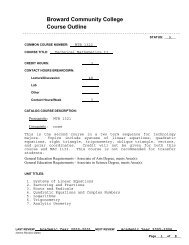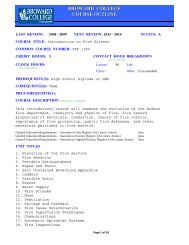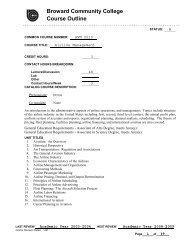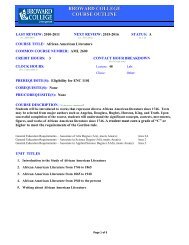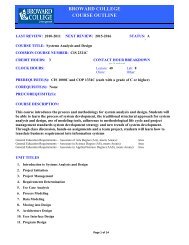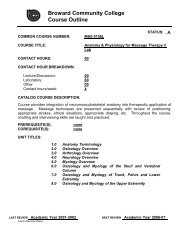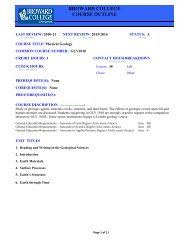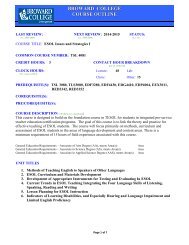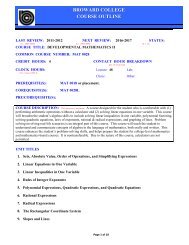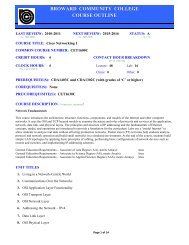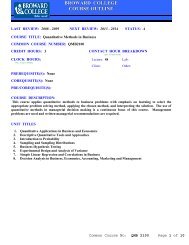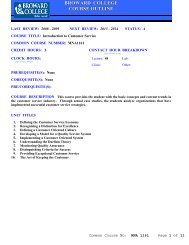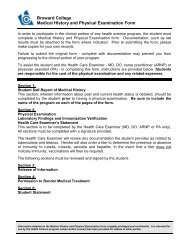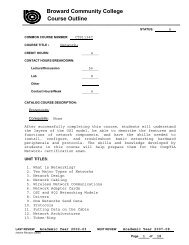Course Outline Information (FRE1121.pdf) - Broward College
Course Outline Information (FRE1121.pdf) - Broward College
Course Outline Information (FRE1121.pdf) - Broward College
You also want an ePaper? Increase the reach of your titles
YUMPU automatically turns print PDFs into web optimized ePapers that Google loves.
BROWARD COLLEGE<br />
COURSE OUTLINE<br />
LAST REVIEW: 2010-2011 NEXT REVIEW: 2015-2016 STATUS: A<br />
COURSE TITLE: Beginning French 2<br />
COMMON COURSE NUMBER: FRE 1121<br />
CREDIT HOURS:<br />
CONTACT HOUR BREAKDOWN<br />
CLOCK HOURS: Lecture: 64 Lab:<br />
Clinic:<br />
Other:<br />
PREREQUISITE(S): A grade of C or better in FRE1120 or equivalent and/or instructor’s approval.<br />
COREQUISITE(S): None<br />
PRE/COREQUISITE(S): None<br />
COURSE DESCRIPTION: Continuation of FRE 1120. Further development of the basic skills in<br />
speaking, listening-comprehension, reading, writing, and appreciation of Francophone culture. Classroom<br />
practice and exercises supplemented by laboratory and/or multi-media activities designed to develop and<br />
enhance communicative competence and cultural sensitivity. Skills and concepts are further polished in<br />
FRE 2220. Students are encouraged to study abroad. Special fee charged.<br />
General Education Requirements – Associate of Arts Degree (AA), meets Area(s): Area 2B an 8<br />
General Education Requirements – Associate in Science Degree (AS), meets Area(s): Area 2 or 5<br />
General Education Requirements – Associate in Applied Science Degree (AAS), meets Area(s): Area<br />
UNIT TITLES<br />
1. Review and Reinforce learning Outcomes of FRE 1120<br />
2. Express Past Experience<br />
3. Use of Pronouns<br />
4. Cultural Readings<br />
Page 1 of 9
BROWARD COLLEGE<br />
COURSE OUTLINE<br />
*** Complete the following only if course is seeking general education status ***<br />
GENERAL EDUCATION Competencies and Skills *:<br />
In the box to the right of the Competency/Skill, enter all specific student learning outcome unit numbers, as indicated in the course outline<br />
(i.e. 1.1, 2.7, 4.2, 4.0 and 5.12) that apply.<br />
<strong>Course</strong> must include all of the following:<br />
1. Read with critical comprehension** 1.6, 5.1, 5.3<br />
2. Write clearly and coherently** 1.2, 1.3, 2.3, 2.4, 2.5, 4.4, 4.5, 5.2<br />
3. Demonstrate literacy as appropriate within a given 1.1 (b), 1.4 (d), 2.5 (d), 2.7 (d), 3.1 (c), 3.4 (d), 5.0 (d), 5.1 (c),<br />
discipline**<br />
5.2 (b), 5.4 (g)<br />
4. Apply problem solving skills or methods to make 1.4, 2.3, 3.4, 5.4<br />
informed decisions in a variety of contexts**<br />
<strong>Course</strong> must include at least one of the following:<br />
5. Differentiate between ethical and unethical behavior<br />
6. Demonstrate an understanding of the physical,<br />
2.5, 3.2, 5.1<br />
biological, and social environments and how individual<br />
behaviors impact this complex system.<br />
7. Demonstrate an understanding of and appreciation for 1.5, 2.5, 5.1, 5.4<br />
human diversities and commonalities.<br />
8. Speak and listen effectively. 1.1, 2.4, 3.1<br />
*General Education Competencies and Skills endorsed by 2010-2011 General Education Task Force<br />
**Required Competencies<br />
1) Read with critical comprehension.<br />
The student will be introduced to the basic texts, concepts, vocabulary, and methods necessary for developing<br />
an understanding of the discipline and meeting the required benchmarks as stated in the course outline.<br />
2) Write clearly and coherently.<br />
The student will demonstrate an understanding and mastery of subject matter in a variety of ways, including<br />
writing. Writing activities may include both graded and ungraded essays, short answer quizzes, summaries,<br />
reactions, journals, and various other reports.<br />
3) Demonstrate and apply literacy across all the disciplines (indicate which ones apply).<br />
a) <strong>Information</strong> literacy means understanding how to locate needed information, using the appropriate<br />
technology for the task, managing and evaluating the extracted information and using it effectively and<br />
ethically.<br />
b) Technology literacy is the ability to responsibly and effectively use appropriate technology to access,<br />
manage, integrate, or create information, and/or use technology to accomplish a given task.<br />
c) Workplace literacy is having the appropriate knowledge and skills to communicate and work with<br />
others effectively and perform job duties, whether it is through the use of computers and/or other<br />
technology.<br />
d) Cultural literacy is recognizing, understanding, and appreciating the similarities and differences<br />
between one’s own culture and the cultures of others through a study of the arts, customs, beliefs,<br />
values, and history that define a culture.<br />
e) Quantitative literacy is having the ability to formulate, solve and interpret mathematical/statistical<br />
operations and graphical/tabular representations to make informed decisions.<br />
f) Scientific literacy means understanding the methodology and application of the scientific process, the<br />
physical and biological worlds, and recognizing that scientific knowledge is continuously updated or<br />
revised as new information is discovered.<br />
Page 2 of 9
BROWARD COLLEGE<br />
COURSE OUTLINE<br />
g) Environmental literacy is creating a context within which environmental issues can be viewed, imparting<br />
knowledge to enhance one’s ability to analyze the issues, make the connections between humans’ decisions and<br />
actions and the challenges facing the environment, and instilling the desire to sustain the environment through<br />
ethical practices in both one’s professional and personal lives.<br />
4. Apply problem-solving skills or methods to make informed decisions in a variety of contexts.<br />
The student will use acquired skills or methods to recognize, analyze, adapt, and apply critical<br />
thinking to solve problems and make informed decisions.<br />
Page 3 of 9
BROWARD COLLEGE<br />
COURSE OUTLINE<br />
EVALUATION:<br />
In the box to the right of the Methods of Assessment, enter all specific learning outcome numbers (i.e. 1.1, 2.7, 4.0, 4.2 and 5.12) that apply.<br />
1. Portfolio<br />
2. Short essays<br />
3. Research Papers 5.2<br />
4. Group projects<br />
5. Discussions (In class and online) 2.5, 3.1, 3.4, 4.4<br />
6. Multiple Choice tests<br />
7. Presentations 5.2<br />
8. Service Learning Projects<br />
9. Quizzes (pop, announced, etc.)<br />
10. Take-home tests<br />
11. Summaries, critiques, and analyses 2.6, 2.7<br />
12. Reaction papers<br />
13. Surveys<br />
14. Performance 1.2, 2.4, 3.2, 5.0<br />
15. Short answer tests<br />
16. Classroom debates and colloquia 5.1<br />
17. Online lab and internet assignments 1.1, 1.3, 2.1, 2.2, 2.3, 2.5, 3.1, 4.1, 4.4, 5.2<br />
18. Short compositions 1.6 2.4, 2.5, 5.1, 5.2, 5.3, 5.4<br />
Page 4 of 9
BROWARD COLLEGE<br />
COURSE OUTLINE<br />
Common <strong>Course</strong> Number: FRE 1121<br />
UNITS<br />
Unit 1 Review and Reinforce Learning Outcomes of FRE 1120<br />
General Outcome:<br />
1.0 The students shall be able to demonstrate comprehension and application of<br />
French grammar and important French cultural aspects learned in FRE1120.<br />
Specific Measurable Learning Outcomes:<br />
Upon successful completion of this unit, the students shall be able to:<br />
1.1 Analyze and apply basic French Pronunciation and Communication skills. Students shall<br />
use the online lab program to accomplish tasks.<br />
1.2 Describe people, places and things.<br />
1.3 Express Present Reality.<br />
1.4 Apply idioms and compare relevant aspects of the Francophone culture to the U.S.<br />
1.5 Communicate time and numbers and distinguish their implications in the daily<br />
Francophone life.<br />
1.6 Demonstrate an ability to read and interpret select cultural readings in French.<br />
Page 5 of 9
BROWARD COLLEGE<br />
COURSE OUTLINE<br />
Unit 2 Express Past Experience<br />
General Outcome:<br />
Common <strong>Course</strong> Number: FRE 1121<br />
2.0 The students shall be able to demonstrate the proper use of the passé<br />
composé and the imperfect tenses in oral and written communication.<br />
Specific Measurable Learning Outcomes:<br />
Upon successful completion of this unit, the students shall be able to:<br />
2.1 Indicate the passage of time for ongoing actions as well as completed past actions.<br />
2.2 Recognize and use the recent past tense.<br />
2.3 Recognize and use regular and irregular verbs in the passé composé.<br />
2.4 Recognize and use regular and irregular verbs in the imperfect tense.<br />
2.5 Compare the use of recent past, passé composé, and imperfect tenses and examine the<br />
different applications in other languages.<br />
2.6 Combine passé composé and imperfect to formulate narrations, both orally and in writing.<br />
2.7 Apply the knowledge of both tenses in discussion of historical, religious, and cultural<br />
events in the Francophone world.<br />
Page 6 of 9
BROWARD COLLEGE<br />
COURSE OUTLINE<br />
Common <strong>Course</strong> Number: FRE 1121<br />
Unit 3 Communicate Preferences, Desires, Emotions<br />
General Outcome:<br />
3.0 The students shall be able to indicate past and present choices and desires..<br />
Specific Measurable Learning Outcomes:<br />
Upon successful completion of this unit, the students shall be able to:<br />
3.1 Differentiate between desires and obligations by employing the irregular verbs VOULOIR,<br />
POUVOIR, and DEVOIR.<br />
3.2 Indicate and inquire about specific selections by utilizing the appropriate interrogative and<br />
demonstrative adjectives to refer to objects.<br />
3.3 Construct negative statements demonstrating various degrees of dislike.<br />
3.4 Compare how preferences are expressed differently in English, with emphasis on the<br />
cultural and philosophical concept of loving people, things, and activities.<br />
Page 7 of 9
BROWARD COLLEGE<br />
COURSE OUTLINE<br />
Common <strong>Course</strong> Number: FRE 1121<br />
Unit 4 Use of Pronouns<br />
General Outcome:<br />
4.0 The students shall be able to successfully employ direct and indirect object<br />
pronouns. Additionally, the student will identify reciprocal actions and learn how<br />
to link words and phrases with relative pronouns.<br />
Specific Measurable Learning Outcomes:<br />
Upon completion of this unit, the students will be able to:<br />
4.1 Recognize the direct object of a sentence and properly used pronouns to avoid repetition.<br />
4.2 Demonstrate correct pronoun placement with commands.<br />
4.3 Express the idea of each other or one another as presented in the reflexive and reciprocal<br />
verb constructions.<br />
4.4 Select relative pronouns to link multiple phrases.<br />
Page 8 of 9
BROWARD COLLEGE<br />
COURSE OUTLINE<br />
Common <strong>Course</strong> Number: FRE 1121<br />
Unit 5 Cultural Readings<br />
General Outcome:<br />
5.0 The students shall demonstrate a better understanding of the world and<br />
recognize its diversity and commonalities through readings, writing<br />
opportunities and class discussions.<br />
Specific Measurable Learning Outcomes:<br />
Upon successful completion of this unit, the students shall be able to:<br />
5.1 Read and comprehend selected readings in French. Demonstrate cultural literacy and a<br />
greater understanding of others and self in terms of linguistic and cultural differences.<br />
Through a series of cultural readings and dialogues students shall be able to discuss and<br />
compare cultural differences on important topics dealing with college life, family,<br />
shopping, home life, entertainment, and food.<br />
5.2 Acquire vocabulary, improve pronunciation, and write short compositions. Expand their<br />
linguistic and cultural literacy beyond the textbook by researching and presenting other<br />
related cultural topics through written and oral assignments and the use of technology and<br />
multimedia tools.<br />
5.3 Analyze grammatical and cultural aspects of the readings and argue its universal value.<br />
5.4 Relate and value the natural and social settings that inform our planet across the experience<br />
of the different civilizations that make up the Francophone world, i.e. natural phenomena<br />
and development, ecotourism and the environment, modern living and its consequence on<br />
the physical world and social relations and institutions.<br />
Page 9 of 9



